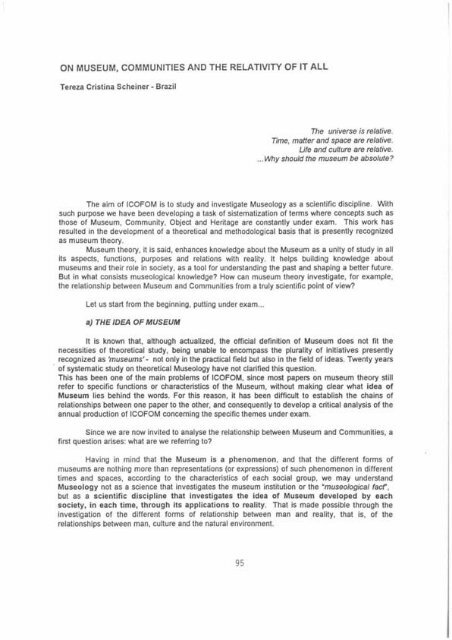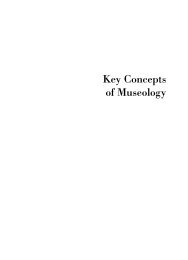ISS 25 (1995).pdf - The International Council of Museums
ISS 25 (1995).pdf - The International Council of Museums
ISS 25 (1995).pdf - The International Council of Museums
Create successful ePaper yourself
Turn your PDF publications into a flip-book with our unique Google optimized e-Paper software.
ON MUSEUM, COMMUNITIES AND THE RELATIVITY OF IT ALL<br />
Tereza Cristina Scheiner - Brazil<br />
<strong>The</strong> universe is relative.<br />
Time, matter and spac:e are relative.<br />
Life and cuffure are relative .<br />
... Why should the museum be absolute?<br />
<strong>The</strong> aim <strong>of</strong> ICOFOM is to study and investigate Museology as a scientific discipline. With<br />
such purpose we have been developing a task <strong>of</strong> sistematization <strong>of</strong> terms where concepts such as<br />
those <strong>of</strong> Museum, Community, Object and Heritage are constantly under exam. This work has<br />
resulted in the development <strong>of</strong> a theoretical and methodological basis that is presently recognized<br />
as museum theory.<br />
Museum theory, it is said, enhances knowledge about the Museum as a unity <strong>of</strong> study in all<br />
its aspects, functions, purposes and relations with reality. It helps building knowledge about<br />
museums and their role in society, as a tool for understanding the past and shaping a beller future .<br />
But in what consists museological knowledge? How can museum theory investigate, for example,<br />
the relationship between Museum and Communities from a truly scientific point <strong>of</strong> view?<br />
Let us start from the beginning, pulling under exam ...<br />
a) THE IDEA OF MUSEUM<br />
It is known that, although actualized, the <strong>of</strong>ficial definition <strong>of</strong> Museum does not fit the<br />
necessities <strong>of</strong> theoretical study, being unable to encompass the plurality <strong>of</strong> initiatives presently<br />
recognized as 'museums' - not only in the practical field but also in the field <strong>of</strong> ideas. Twenty years<br />
, <strong>of</strong> systematic study on theoretical Museology have not clarified this question.<br />
This has been one <strong>of</strong> the main problems <strong>of</strong> ICOFOM, since most papers on museum theory still<br />
refer to specific functions or characteristics <strong>of</strong> the Museum, without making clear what idea <strong>of</strong><br />
Museum lies behind the words. For this reason, it has been difficult to establish the chains <strong>of</strong><br />
relationships between one paper to the other, and consequently to develop a critical analysis <strong>of</strong> the<br />
annual production <strong>of</strong> ICOFOM conceming the specific themes under exam.<br />
Since we are now invited to analyse the relationship between Museum and Communities, a<br />
first question arises: what are we referring to?<br />
Having in mind that the Museum is a phenomenon, and that the different forms <strong>of</strong><br />
museums are nothing more than representations (or expressions) <strong>of</strong> such phenomenon in different<br />
times and spaces, according to the characteristics <strong>of</strong> each social group, we may understand<br />
Museology not as a science that investigates the museum institution or the "museological facf',<br />
but as a scientific discipline that investigates the idea <strong>of</strong> Museum developed by each<br />
society, in each time, through its applications to reality. That is made possible through the<br />
investigation <strong>of</strong> the different forms <strong>of</strong> relationship between man and reality, that is, <strong>of</strong> the<br />
relationships between man, culture and the natural environment.<br />
95
















